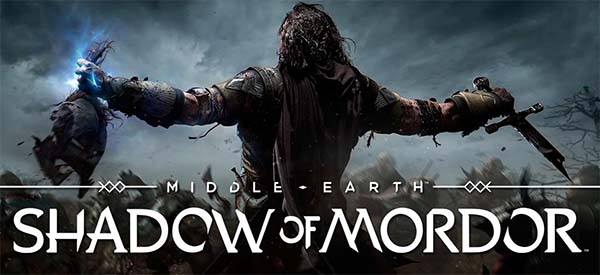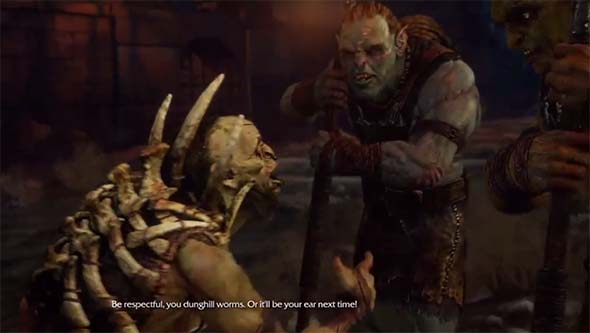
Shadow of Mordor was a game that almost sold me on the next gen consoles. I knew I was going to need a PS4 for Bloodborne, and I was very tempted to buy one early so that I could play Mordor. The central game mechanic of orc NPCs fighting amongst each other in order to become Sauron's personal favorite sounded like an interesting mechanic for organic story-telling. It was a concept that sounded like something truly deserving of the name "next gen". The biggest thing that held me back was the fact that the game was also available on last-gen consoles, so I figured it probably wasn't pushing any serious boundaries of game design.
Bat-Assassin's Creed: Arkham Middle Earth
The basic gameplay is highly derivative of Assassin's Creed and the Batman Arkham games. It ports both of these feature sets more or less as competently as those original games, including the same perks and problems. The free running feature suffers from the same lack of control that plague's Assassin's Creed, in that it's sometimes hard to predict exactly where the character will land, and he loves to climb up a wall if you run too close to it. Is it really that hard to allocate a dedicated "climb" or "jump" button?! In Mordor's defense, every button on the controller is mapped to something, so at least it has an excuse (unlike Assassin's Creed with its redundant jump button).

The martial culture of the orcs means that when they find a dead comrade,
they assume he was murdered by an ambitious peer, leaving the player off-the-hook.
Stealth mechanics work pretty well; although the orcs are a bit oblivious to my movements through the game world. Sometimes, I can be moving right across their field of vision within 10 feet of them, but because I'm crouched or hanging off a wall, they just don't see me. Orcs don't care much about each other. Their martial culture means that when they find a fellow orc dead, they assume that he was killed due to his own stupidity, or in a brawl / duel with another orc. This removes the need to drag and dispose of bodies while also masking the fact that orcs don't look for the player when they find a dead body. There are examples of stealth games in which enemy guards don't notice or care about dead bodies that they find, and that's always immersion-breaking. Shadow of Mordor cleverly turns what could have been an immersion-breaking limitation of the A.I. into an appropriate element of the world and narrative. As long as they don't actually see you kill their fellow orc, you can rest assured that throwing an archer off a ledge won't alert any guards who pass below to your presence.
Combat mechanics are almost identical to Arkham Asylum, except you have an ethereal bow instead of all the gadgets or grappling hook. But it also blends some elements of Assassin's Creed insta-kills into the fighting mechanics as well. Fights are much more challenging than in Assassin's Creed because you can't insta-kill enemies when you parry them. Instead, you can stun them and then perform an execution or coup de grace, but you're not impervious during this time. You have to time your coup de graces appropriately in order to avoid being hit in the middle of slitting a prone orc's throat. There are insta-kill special attacks that behave a bit more like Assassin's Creed's counter kills, but you have to build up a combo streak before they become available.
Executing a coup de grace [LEFT] on a single orc in a mob requires split-second precise timing.
Or you can perform a combat execution [RIGHT] mid-combo if you get your hit streak high enough.
Attacks are fluid, controls are responsive, timing is tight, and you can counter or dodge out of any single attack or action. This all combines to give the player a tremendous sense of control as long as you are patient and deliberate in your button-pressing. The strict timing will severely punish you for button-mashing, which makes the combat challenging and satisfying throughout the game.
[More]
e19c6919-e126-48e1-86f1-53470b917754|2|3.0
Tags:Middle Earth: Shadow of Mordor, the Lord of the Rings, Monolith Productions, Warner Brothers Interactive Entertainment, J.R.R. Tolkien, orc, undead, wraith, elf, Gollum, Smeagol, Mordor, Middle Earth, Sauron, Lathariel, women, equality, gender equality, action, open world, sandbox, parkour, RPG, movie tie-in